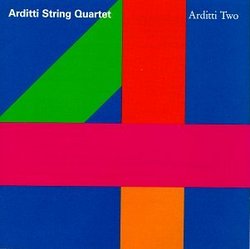| All Artists: Irvine Arditti, Rohan de Saram, Sofia Gubaidulina Title: Arditti 2 - Béla Bartók: String Quartet No. 4 / Sofia Gubaidulina: String Quartet No. 3 / Alfred Schnittke: String Quartet No. 2 - Arditti String Quartet Members Wishing: 3 Total Copies: 0 Label: Gramavision Release Date: 8/1/1992 Genres: Jazz, Pop, Classical Style: Chamber Music Number of Discs: 1 SwapaCD Credits: 1 UPC: 798387943927 |
Search - Irvine Arditti, Rohan de Saram, Sofia Gubaidulina :: Arditti 2 - Béla Bartók: String Quartet No. 4 / Sofia Gubaidulina: String Quartet No. 3 / Alfred Schnittke: String Quartet No. 2 - Arditti String Quartet
CD Details |
CD ReviewsThree superb modern string quartets Bruce Hodges | New York, NY | 10/28/2002 (5 out of 5 stars) "Doing a little research, I had forgotten that this recording was nominated for a Grammy in 1991 for "Best Chamber Music Performance" - an accolade it certainly deserved. (FYI for the curious: the winners that year were Ax, Laredo, Ma, and Stern doing Brahms quartets.) Called "Arditti II," this is a compilation of three strong but strikingly different works. The Bartok and Schnittke are terrific, but since they have been recorded (excellently) by other groups, I want to focus on the Gubaidulina, which is also memorable - and rare. In a single flowing movement, the piece is about 20 minutes long, and makes liberal use of contemporary instrumental techniques, i.e., those created to extend the range of sounds traditionally made by a string quartet. The piece opens "ppp" with an eerie pizzicato section and closes with sweetly lyrical glissandi, trailing off into nothingness. In between are delicate episodes that occasionally surge into violence; the overall tone, though, is quiet and haunting. Gubaidulina is one of the most original composers writing today, and this piece is one of her finest. The playing of the Arditti Quartet is world-renowned, and for good reason. Very few chamber ensembles are so totally devoted to 20th-century (and now 21st-century) literature, and the polish and seeming effortlessness of these musicians can sell you on almost any composer's work. Great sound, too: clear and not too reverberant, balancing all four instruments well, and showing off the masterly writing in all three pieces to best advantage. A favorite for many reasons." The Schnittke is the big attraction here Christopher Culver | 11/24/2008 (4 out of 5 stars) "The Arditti Quartet recording released on Naive/Montaigne throughout the 1990s offer some of the most reliable performances of contemporary music, and this disc from 1992 is no exception. Bela Bartok's String Quartet No. 4 (1927) is extremely representative of his mature work with its symmetrical structure, highly confident use of extended techniques, quarter tones, and dance rhythms. The latter of both the inner and outer framing movements is a development on the first, and the central movement is an example of his eerie "night music". I have to admit, though, that the Fourth is not my favourite Bartok quartet, and I like the Third a lot better, an elegantly compact work with not a note wasted. Furthermore, as much as I love the Ardittis, my favourite performances of the Bartok quartets are those by the Keller Quartet (now available on a budget Apex disc). Alfred Schnittke's String Quartet No. 2 (1980) is one of the masterpieces of his mature polystylic period, and leaves me regretting that I haven't checked out his string quartets earlier. As it was written in memory of the Russian filmmaker Larissa Shepitko, this is a deeply tragic work, taking a Russian hymn tune and wringing all kinds of dissonant variations from it. The second movement is among the most striking in all of Schnittke's output, marked "Agitato" and mainly a furiously fast ostinato. I'd love to see this live, because the performers undoubtedly have to put an enormous amount of effort into it. The last movement suggests some kind of acceptance of events, and the quartet sound out the hymn ever more overtly, eventually ending with harmonics at the very upper limit of their range. Such endings seemed especially attractive to religious figures in Soviet music--one need only think of Schnittke's Cello Concerto No 1 or Gubaidulina's "Offertorium"--and here it works wonderfully. Sofia Gubaidulina's single-movement String Quartet No. 3 (1987) is in a bipartite form where the first half of the piece is mainly pizzicato and the second sul arco. The mood throughout is meditative. Again, this isn't my favourite string quartet by this composer, and I rather prefer the Second with its divine G rising out of silence. While I don't get too much from the Bartok and the Gubaidulina here, the Schnittke is impressive enough that I still give the disc a full recommendation." Multi dimensional playing villegem | canada | 06/09/2008 (5 out of 5 stars) "Back in 1989, the Arditti String Quartet visited Calgary and played at the University Theatre. After their superb performance of the Ligeti second quartet, some in the audience left... Few months later, I was lucky to get into the new Auditorium du Louvres where the Arditti Quartet was playing: the place was packed, with people on stairs!
I agree wholeheartedly with the previous reviewer: this is a tremendously sensitive and intelligent performance. The Schnittke second quartet is incredibly rich in colors. The pulsation is always present, the folk melodies underlying the rich texture are well defined and never forced. The fourth movement is simply out of this world. This performance shames the fashionable, predictable, mono dimensional Kronos. This CD should be made available again and one can only shake their head in disbelief that they did not win the grammy..." |


 Track Listings (10) - Disc #1
Track Listings (10) - Disc #1